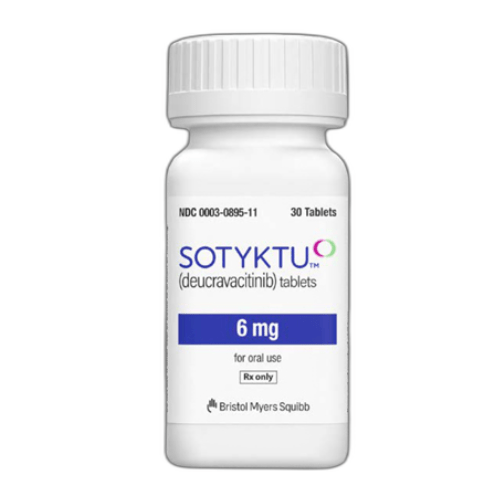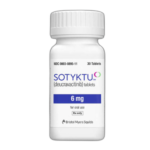About Deucravacitinib
- Sotyktu received Food and Drug Administration (FDA) approval on September 9, 2022 Sotyktu is a tyrosine kinase 2 (TYK2) inhibitor that belongs to the family called multikinase inhibitors.
- Sotyktu is a medication prescribed for adults with moderate-to-severe plaque psoriasis eligible for systemic therapy or phototherapy. However, it is not advised for use in combination with other potent immunosuppressants.
- Deucravacitinib, is chemically represented as 6-(cyclopropanecarbonylamido)-4-[2-methoxy-3-(1-methyl-1,2,4-triazol-3-yl)anilino]-N-(trideuteriomethyl)pyridazine-3-carboxamide.
- It has a molecular formula of C20H19D3N8O3, and the molecular weight of the free base is 425.47.
- Deucravacitinib inhibits TYK2 by stabilizing an inhibitory interaction within its regulatory and catalytic domains, preventing receptor-mediated activation and downstream signaling of STATs in cell-based assays.
- TYK2 pairs with JAK1 and JAK2 in JAK-STAT pathways. The exact mechanism linking TYK2 inhibition to treating moderate-to-severe plaque psoriasis is not fully understood.
- Plaque psoriasis is a persistent autoimmune skin disorder marked by the rapid accumulation of skin cells, leading to the development of thick, red, and scaly patches referred to as plaques.
- These plaques, varying in size, commonly emerge on body areas like elbows, knees, scalp, and lower back. The condition arises when the immune system erroneously triggers an excess production of skin cells.
- Symptoms encompass red and inflamed skin, silvery scales, dry and cracked skin, itching and irritation, thickened nails, and joint pain.
- Although there is no cure, diverse treatments, including medications and lifestyle adjustments, can effectively manage symptoms and enhance the overall well-being of individuals with plaque psoriasis. Seeking guidance from a healthcare professional is crucial for an accurate diagnosis and appropriate management.
Strength:
The medicine is available as Sotyktu 6 mg oral tablet.
Recommended Dosage:
To ensure proper use of Sotyktu, follow your doctor’s prescribed regimen. Do not alter your dose without your doctor’s guidance, and if you miss a dose, skip it and take the next scheduled dose without doubling up.
Before starting Sotyktu treatment, assess patients for active and latent tuberculosis (TB) infection. If positive, initiate TB treatment before Sotyktu. Avoid crushing, cutting, or chewing the tablets. Sotyktu is not advised for patients with severe hepatic impairment (Child-Pugh C), and no dosage adjustment is required for those with mild to moderate hepatic impairment. Ensure clarity in administration instructions to enhance patient understanding and adherence.
The recommended dosage is a once-daily oral intake of Sotyktu 6 mg, with or without food.
Important:
Before starting Sotyktu tablet, have a detailed conversation with your doctor about your medical history and current medications. Quit smoking, steer clear of alcohol, and promptly report any new symptoms experienced while on Sotyktu. Provide your healthcare provider with a comprehensive list of all the medications you are taking, including prescriptions, over-the-counter drugs, vitamins, and herbal supplements. Keep a record to share with your healthcare provider and pharmacist when starting a new medication.
Warnings & Precautions
- Do not use this medicine if you are allergic Deucravacitinib, or any of its ingredient as it is contraindicated with Sotyktu.
- Before initiating Sotyktu treatment, it is crucial to consider various factors for patient safety.
- Hypersensitivity reactions, such as angioedema, have been reported, and in the event of a clinically significant reaction, immediate discontinuation is advised.
- Sotyktu may elevate the risk of infections, particularly in patients with active or serious infections.
- Therefore, its use should be avoided under such circumstances, and if a serious infection develops, discontinuation is recommended until the infection resolves.
- Evaluate patients for tuberculosis before starting Sotyktu treatment. Malignancies, including lymphomas, were observed in clinical trials with Sotyktu.
- Additionally, monitor for rhabdomyolysis and elevated CPK levels. Periodic assessments of serum triglycerides and liver enzymes are essential, especially in patients with known or suspected liver disease. Avoid the use of live vaccines during Sotyktu treatment.
- It is crucial to note that potential risks related to TYK2 inhibition, including adverse reactions observed with JAK inhibition, are not fully understood.
- Higher rates of all-cause mortality, cardiovascular events, thrombosis, and malignancies were observed in patients treated with a JAK inhibitor compared to those treated with TNF blockers in rheumatoid arthritis patients.
- Importantly, Sotyktu is not approved for use in rheumatoid arthritis. It is imperative to discuss these considerations with your doctor before starting Sotyktu treatment.
Common Sotyktu Side Effects:
- Upper respiratory infections (common cold, sore throat, and sinus infection)
- Headache
- Nausea
- Fatigue
- Muscle aches and pains
- Increased blood creatine phosphokinase (CPK) levels
- Herpes simplex
- Mouth ulcers
- Folliculitis
- Acne
Use in Specific Population
- Before initiating treatment with this medication, it’s crucial to inform your doctor about any plans for pregnancy or if you are currently pregnant, as the impact on the fetus is unknown.
- If you are breastfeeding or planning to breastfeed, notify your doctor, as it is uncertain whether Sotyktu passes into breast milk. Discuss with your doctor the most suitable way to feed your baby while taking Sotyktu.
- The safety and effectiveness of Sotyktu in pediatric patients have not been established.
- There are no discernible differences in the effectiveness of Sotyktu between patients aged 65 years and older compared to younger adult patients.
- Sotyktu does not require dose adjustments for patients with mild, moderate, or severe renal impairment, including those with end-stage renal disease (ESRD) undergoing dialysis.
- Similarly, no dose adjustment is recommended for patients with mild (Child-Pugh A) or moderate (Child-Pugh B) hepatic impairment. However, the use of Sotyktu is not recommended in patients with severe hepatic impairment (Child-Pugh C).
- Always consult with your doctor and communicate any concerns to ensure a safe and well-informed treatment plan.
Storage and Handling
Before touching Sotyktu tablets, make sure your hands are clean and dry. Wash your hands with soap and water, and avoid handling the tablet with wet hands. If you happen to touch a tablet with wet hands, ensure your hands are thoroughly dry before handling the tablet again.
- Store Sotyktu vials in the refrigerator, maintaining a temperature range of 20° to 25°C (68° to 77°F), and keep them within the carton to protect them from light exposure.
- Do not refrigerate the medicine.
- Keep the medicine away from pets and children.
Sansfro streamlines the prescription medication acquisition process in four simple steps:
- Medication Inquiry: Patients receive a response within 24 hours from Sansfro’s Named Access Programme Support team when inquiring about a specific medication.
- Verification Process: Sansfro confirms medication availability and approval, checking prescription and medical records for accuracy and adherence.
- Medication Procurement: Once verified, Sansfro’s staff contacts their supplier network to efficiently obtain the medication.
- Safe Delivery: Upon finalizing the price, Sansfro arranges secure medication delivery. Their logistics team ensures compliance with standard operating procedures for safe and legal distribution.
To facilitate the import of medication, the Sansfro team requests certain documents from patients at the beginning of the process. These documents include:
- An authorized prescription copy.
- Proof of the patient’s identification.
- Information about the prescribing physician.
- Present home address.
After receiving these documents, the Sansfro team works on preparing and submitting the application for an import license. Obtaining this license, which is obtained following government approval, is a crucial prerequisite for obtaining the required medication.
No news found.
About Sansfro
Sansfro is committed to bridging the healthcare gap. Our purpose is to bring hope and healing to patients suffering from rare diseases by linking them with life-saving treatments through our Named Patient Program. Join us in our quest for a better and healthier world.
Know More...FAQ'S
How does Sotyktu work?
Sotyktu is a tyrosine kinase 2 (TYK2) inhibitor. TYK2 is a protein involved in the body’s immune system. By inhibiting TYK2, Sotyktu helps to reduce inflammation and improve the symptoms of psoriasis.
What are the benefits of taking Sotyktu?
In clinical trials, Sotyktu was effective in clearing or significantly improving psoriasis symptoms in a majority of patients. It may also help to improve the quality of life for people with psoriasis.
What information should I provide to my healthcare provider before starting Sotyktu?
Inform your healthcare provider if you have liver or kidney problems, elevated triglyceride levels, recently received or are scheduled for an immunization (avoid live vaccines during Sotyktu treatment), are pregnant or planning pregnancy (unknown effects on the unborn baby), or are breastfeeding (uncertain if Sotyktu passes into breast milk). Stay open with your healthcare provider to ensure a comprehensive understanding of your health status during Sotyktu treatment.
Who should not take Sotyktu?
Sotyktu should not be taken by people who are allergic to deucravacitinib or any of the ingredients in the medication. It should also not be taken by people with:
- Active, serious infections
- Severe liver or kidney disease
- Tuberculosis
- Certain types of cancer
- Current or a history of serious heart problems, such as heart failure or a recent heart attack
How is Sotyktu tablet taken?
Follow your healthcare provider’s instructions precisely when taking Sotyktu. Take Sotyktu once daily, with or without food. Do not crush, cut, or chew the Sotyktu tablets.
What is the cost of Sotyktu in India?
Sotyktu price in India depends on specific product requirements. For more detailed pricing information, please contact our Patient Support Team at (+91) 93157 05373 or through email at help@sansfro.com.
How do I buy Sotyktu online?
For those looking to buy Sotyktu online, now accessible in both the US and Europe, we recommend getting in touch with the Sansfro Health team or other reputable organizations with expertise in importing medications from these regions. Ensure a reliable and secure process by consulting experienced professionals in the field.

Dr Anchal Aryan
Medical counselor
Patient Stories
Word Wide Delivery:
India, Andorra, Argentina, Australia, Austria, Azerbaijan, Bahrain, Brazil, Bulgaria, Cambodia, Canada, Chile, Colombia, Costa Rica, Croatia, Cyprus, Denmark, Dominican Republic, Estonia, Finland, France, Georgia, Germany, Ghana, Greece, Guatemala, Iraq, Ireland, Israel, Italy, Jamaica, Japan, Jordan, Kenya, Kuwait, Latvia, Lebanon, Libya, Lithuania, Malawi, Mexico, Montenegro, Nepal, Netherlands, New Zealand, Nigeria, Norway, Oman, Pakistan, Paraguay, Peru, Poland, Qatar, Romania, Saudi Arabia, Serbia, Singapore, Slovenia, Spain, Sri Lanka, Sweden, Switzerland, United Arab Emirates, United Kingdom, United States, Venezuela, Zimbabwe, Afghanistan, Albania, Algeria, American Samoa, Angola, Anguilla, Antarctica, etc.



